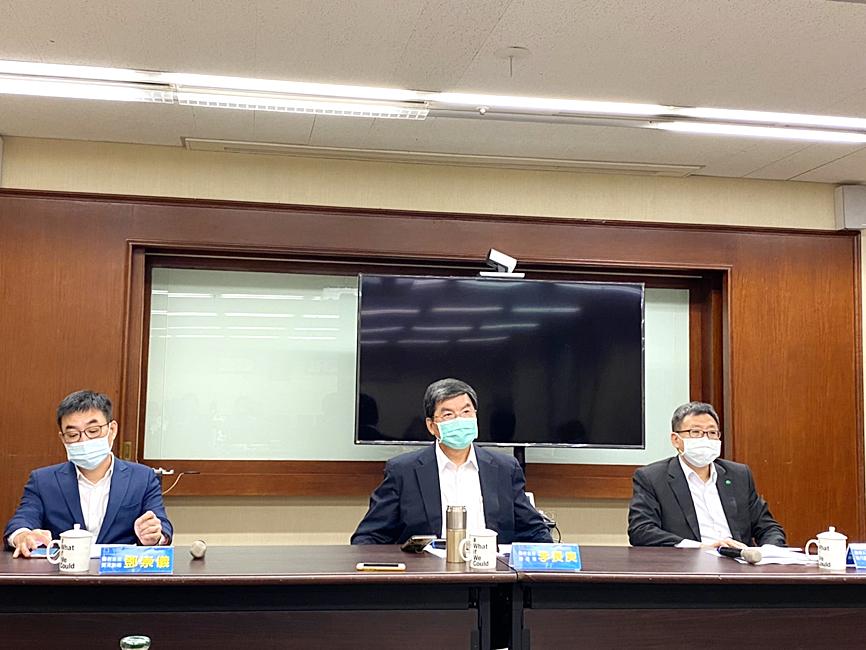Cathay Life Insurance Co (國泰人壽) yesterday said it would recognize an investment loss of NT$8.8 billion (US$298.1 million) in Indonesia’s Bank Mayapada Internasional Tbk PT due to concerns about the lender’s operations amid a corporate scandal.
The company said it would revise its earnings result for June, from a net profit of NT$6.52 billion to a net loss of NT$520 million, its first monthly loss over the past 17 months.
After booking an investment loss of NT$5.2 billion in Bank Mayapada earlier this year, Cathay Life has so far recognized total investment losses of NT$14 billion in the lender, executive vice president Lin Chao-ting (林昭廷) told a news conference in Taipei.

Photo: Wu Chi-lun, Taipei Times
Cathy Life has invested NT$13.3 billion in Bank Mayapada since 2015 and recognized a net profit of NT$700 million over the past five years.
However, the recognized investment loss of NT$8.8 billion has completely written off its investment in the Indonesian lender, Lin said.
The company conducted due diligence of Bank Mayapada at the end of last month, discovering that the lender’s non-performing loan ratio stood at 6.94 percent, higher than the industry average of below 3 percent, although it still made a profit of 143.6 billion rupiah (US$9.73 million) for the first half of this year, Lin said.
Benny Tjokrosaputro, one of the lender’s debtors, was in January named a suspect in a bribery case involving PT Asuransi Jiwasraya, which had also triggered a run on the bank, he said.
Despite its losses of NT$14 billion in the lender, Cathay Life is still considering whether to raise its stake in the lender from 37.33 percent to 51 percent, Cathay Financial Holding Co (國泰金控) president Lee Chang-ken (李長庚) said.
“We are still talking with the Indonesian government and the bank’s controlling shareholder Tahir family about many issues, including how to handle the loans offered to Benny Tjokrosaputro,” Lee said.
“Based on our investment in Vietnam and Cambodia, we believe that if we have controlling power over the investment entity, the returns would be solid. So we are still evaluating if we should be a controlling shareholder in Bank Mayapada,” Lee said.
The insurer might reach a conclusion in three months, he added.
Cathay Life yesterday reported net profit of NT$12.2 billion for last month, the highest for a single month, due to advancing payment of cash dividends, while its cumulative profit for the first seven months rose 29 percent year-on-year to NT$31.5 billion, Lin said.

To many, Tatu City on the outskirts of Nairobi looks like a success. The first city entirely built by a private company to be operational in east Africa, with about 25,000 people living and working there, it accounts for about two-thirds of all foreign investment in Kenya. Its low-tax status has attracted more than 100 businesses including Heineken, coffee brand Dormans, and the biggest call-center and cold-chain transport firms in the region. However, to some local politicians, Tatu City has looked more like a target for extortion. A parade of governors have demanded land worth millions of dollars in exchange

An Indonesian animated movie is smashing regional box office records and could be set for wider success as it prepares to open beyond the Southeast Asian archipelago’s silver screens. Jumbo — a film based on the adventures of main character, Don, a large orphaned Indonesian boy facing bullying at school — last month became the highest-grossing Southeast Asian animated film, raking in more than US$8 million. Released at the end of March to coincide with the Eid holidays after the Islamic fasting month of Ramadan, the movie has hit 8 million ticket sales, the third-highest in Indonesian cinema history, Film

Taiwan Semiconductor Manufacturing Co’s (TSMC, 台積電) revenue jumped 48 percent last month, underscoring how electronics firms scrambled to acquire essential components before global tariffs took effect. The main chipmaker for Apple Inc and Nvidia Corp reported monthly sales of NT$349.6 billion (US$11.6 billion). That compares with the average analysts’ estimate for a 38 percent rise in second-quarter revenue. US President Donald Trump’s trade war is prompting economists to retool GDP forecasts worldwide, casting doubt over the outlook for everything from iPhone demand to computing and datacenter construction. However, TSMC — a barometer for global tech spending given its central role in the

Alchip Technologies Ltd (世芯), an application-specific integrated circuit (ASIC) designer specializing in server chips, expects revenue to decline this year due to sagging demand for 5-nanometer artificial intelligence (AI) chips from a North America-based major customer, a company executive said yesterday. That would be the first contraction in revenue for Alchip as it has been enjoying strong revenue growth over the past few years, benefiting from cloud-service providers’ moves to reduce dependence on Nvidia Corp’s expensive AI chips by building their own AI accelerator by outsourcing chip design. The 5-nanometer chip was supposed to be a new growth engine as the lifecycle